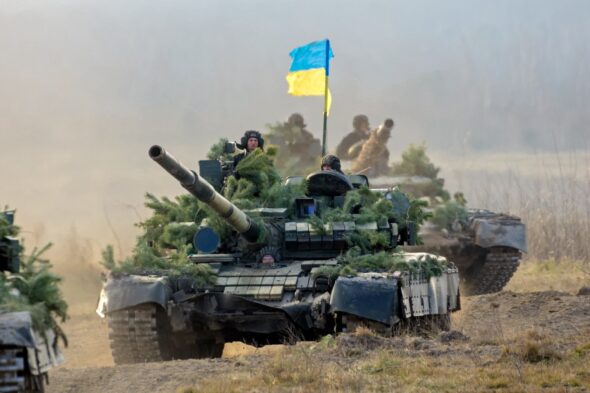More than 100 days of regular war caused by Russia’s illegal aggression against Ukraine have passed. While the war serves no one, the success of Ukraine is in the Polish interest, because only such a success can improve Polish security. One thing is certain: this is the definitive end of the comfort zone, and the West should learn from it – writes Patrick Gorgol, an expert on international relations. „The United States and Europe must get themselves as well as Ukraine ready for a long confrontation,” Gorgol adds.
A long march ahead
Russia expected that the „special military operation” would end with a quick and spectacular success that would consolidate its power, and Moscow would gain more than its bargaining position would suggest. However, the Ukrainian determination unveiled that Russia’s cards are much weaker than most people thought. The bluff failed.
Russia has so far suffered a strategic defeat that will degrade its importance for decades. The problem – as I said in my interview for BiznesAlert – is that Russia is dragging Ukraine (on whose territory the war is going on and which is devastated) with her to the bottom. At the same time, sanctions are brutally testing the Russian economy. It is due to the fact that over the past 30 years Russian elites have been more concerned with getting rich than modernizing their country.
However, all this does not mean that Russia will tip its tail and withdraw from Ukraine. On the contrary, those who assume that Russia will now increase its efforts in order to achieve at least tactical successes (seizing part of Ukrainian territory) are right. The world’s powers reluctantly come to terms with their failures (like the US and the USSR in Afghanistan or the US in Vietnam). It could be the same this time.
Thus, while the Russians might already be aware that the aggression against Ukraine was a mistake (since they could have achieved their political goals, for example, by acting below the threshold of war), their resources at this stage are not exhausted enough to be ready to withdraw immediately, let alone admit their defeat. It is more likely that they will try to increase efforts, even if it weakens Russia, and in the future it will lead to its even bigger defeat. Raise the stakes and buckle up.
That is why the United States and Europe must prepare themselves as well as Ukraine for a long confrontation – even if they hope to reach an agreement sooner. The stronger the sanctions against Russia and the greater the military support for Kyiv, the better Ukraine’s position at the negotiating table will be, when both sides will decide that negotiations are a good solution.
The sanctions against Russia and support for Ukraine will be more conducive to peace than a forced solution to save Putin’s face at the expense of Ukraine.
One may scoff at the calls made by French President Macron or German Chancellor Scholz to President Putin, but – even leaving aside the fact that some of these contacts take place after consultation with the Ukrainian side – the United States and the European Union have reacted in a very decisive way by imposing powerful sanctions. Russia did not expect it to happen and the sanctions are devastating the Russian economy. Russians expected this to be a small, victorious war with symbolic sanctions imposed by the EU to save face. However, it turns out that the end is nowhere in sight, the war is a strategic error, the sanctions are severe and Ukraine is receiving huge humanitarian, financial, military and political support.
It can also be pointed out that the sanctions could be even more strict, and this is true, but the reaction of the West should be assessed as „above expectations” – especially with such divergent interests of individual states. The United States and the European Union have passed the test.
Paris and Berlin have the same fundamental problem – they are unwilling to leave their comfort zone as part of which, for several years now, all disputes in Europe have been settled at the negotiation table. After all, it wasn’t the Germans or the French who had to foot the bill for Russian claims, but those who unfortunately live in the vicinity of the Federation’s borders. The war ends this predictable world to which both countries would be happy to return, as indicated by the suggested formula „peace for territory”, and the search for a solution that allows Russia to „save face”. Other consequences, which the „old” Europe would like to avoid paying for, include the coming economic crisis (caused by COVID-19, and exacerbated by the war), food shortages due to restricted export from Ukraine, and a migration disaster.
However, as long as the Ukrainians have the resources, the support of the EU states and the assistance of the US, such a development is very unlikely, because no Ukrainian politician in this situation will decide to make territorial concessions to Moscow. The Ukrainian people simply would not recognize them.
It is worth to mention one more aspect. If Ukraine (under a hypothetical scenario) now paid such a price and gave part of its territory in exchange for „peace”, then what would guarantee this „peace” would last? Would it be more lasting than the Budapest Memorandum from 1994, which was to ensure Ukrainians that their independance and territorial integrity were safe? History shows that appeasement policy only buys time and does not create lasting solutions. The difference would be that Russia would start the next confrontation with Ukraine on better terms and would have time to correct the mistakes it made during the current war.
The course of this war will determine the negotiation position of both sides. It will also decide whether it will be possible to strike a long-lasting agreement. That is why the West should take action to improve Kyiv’s negotiating position so that a lasting agreement can be reached, breaking of which will not be profitable for either side, and the West should not press Ukraine for concessions.
The security must be ensured not only in the military dimension
Russian aggression against Ukraine may lead not only to the enlargement of NATO, but also to the increase of investments of European NATO members in military security. Such modernization will be based on the recognition of Russia as an increasingly serious threat. NATO countries’ resources and access to modern technologies means they can afford the modernization without drastically lowering the standard of living of their citizens.
Strengthening the military is an obvious direction, but not the only one in the context of security. The European Union will irreversibly speed up the processes related to energy security and will strive to break its dependence on Russian resources. Today it is no longer necessary to convince others to the views that Polish politicians have been spreading for years – that for Russia trading fuels with the West is not about business, but about achieving political goals. The European Union must also be prepared for the next migration crises – including those caused by the hunger in the Middle East and Africa.
The real challenge, however, will be to ensure the security of the supply chain in the event of another conflict. Europe, similarly to the United States, is in some industries dependent on supplies from Asia, and the possibility of cutting supply chains may in the future play the same role as the threat of cutting off the oil and gas tap by Russia – this has been foreshadowed by the COVID-19 pandemic. We continue to discuss e.g. the issue of dependence on rare earth elements mined mainly in China.
Europe must therefore strive to adjust its supply chains. It means abandoning the concept that profit is the most important thing and developing an alternative one, which allows for diversification. The next conflict-no matter where it starts-can lead to supply chain disruptions, and we need to prepare for that. How this strategy works is clearly visible in Russia. After all, by cutting Russia off from the supply chains, we have stopped the work of some of its factories. The same can happen to Europe.
Securing supply chains requires politicians to create conditions for global entrepreneurs to change the way they think about doing business. This will also mean higher prices, because investment in new / alternative supply chains will be expensive and the products thus produced will not be cheaper. These are necessary actions, which will not be popular, because the profit from taking them will appear only after the worst of the scenarios comes true. And when it does, it will be too late. Therefore, it is worth to be wise before the damage.









